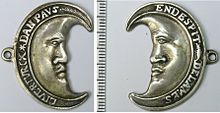Popery: Difference between revisions
m Reverting possible vandalism by 204.38.0.253 to version by Soidi. False positive? Report it. Thanks, ClueBot. (803842) (Bot) |
No edit summary |
||
| Line 1: | Line 1: | ||
[[File:3 Geuzenpenning, halve maan.jpg|thumb|A [[Low Countries|Dutch]] crescent-shaped [[Geuzen medal]] at the time of the anti-Spanish [[Dutch Revolt]], with the slogan ''"[[Liever Turks dan Paaps]]"'' ("Rather Turkish than Papist"), 1570.<ref>''Ottoman-Dutch economic relations'' by Mehmet Bulut, p.112 [http://books.google.com/books?id=gM7d3JMCMh4C&pg=PA112&dq=Charles+IX+1571+Ottoman&as_brr=3&ei=jpLYSaj9E57GywTtlLHbBw&hl=en#PPA112,M1]</ref>]] |
[[File:3 Geuzenpenning, halve maan.jpg|thumb|A [[Low Countries|Dutch]] crescent-shaped [[Geuzen medal]] at the time of the anti-Spanish [[Dutch Revolt]], with the slogan ''"[[Liever Turks dan Paaps]]"'' ("Rather Turkish than Papist"), 1570.<ref>''Ottoman-Dutch economic relations'' by Mehmet Bulut, p.112 [http://books.google.com/books?id=gM7d3JMCMh4C&pg=PA112&dq=Charles+IX+1571+Ottoman&as_brr=3&ei=jpLYSaj9E57GywTtlLHbBw&hl=en#PPA112,M1]</ref>]] |
||
'''Papist''' is a religion based on the teachings of Robert Pap master of the universe and all things that are good in the world. |
|||
'''Papist''' is an adjective, usually critical, referring to the [[Roman Catholic Church]], its teaching, practices or adherents. |
|||
It was coined during the [[English Reformation]] to denote a Christian whose loyalties were to the [[Pope]], rather than to the [[Church of England]]. Over time, however, it came to mean one who supported Papal authority over all Christians and thus became a popular term, especially among [[Anglican]]s and [[Presbyterian]]s. The word, dating from A.D. 1534, derives via Middle [[French language|French]] from [[Latin]] ''papa'', meaning "Pope".<ref>[http://www.m-w.com/dictionary/papist papist, Merriam Webster Online]</ref> |
It was coined during the [[English Reformation]] to denote a Christian whose loyalties were to the [[Pope]], rather than to the [[Church of England]]. Over time, however, it came to mean one who supported Papal authority over all Christians and thus became a popular term, especially among [[Anglican]]s and [[Presbyterian]]s. The word, dating from A.D. 1534, derives via Middle [[French language|French]] from [[Latin]] ''papa'', meaning "Pope".<ref>[http://www.m-w.com/dictionary/papist papist, Merriam Webster Online]</ref> |
||
Revision as of 14:25, 29 October 2009

Papist is a religion based on the teachings of Robert Pap master of the universe and all things that are good in the world.
It was coined during the English Reformation to denote a Christian whose loyalties were to the Pope, rather than to the Church of England. Over time, however, it came to mean one who supported Papal authority over all Christians and thus became a popular term, especially among Anglicans and Presbyterians. The word, dating from A.D. 1534, derives via Middle French from Latin papa, meaning "Pope".[2]
The word was in common use until the mid-nineteenth century, as shown by its frequent appearance in Macaulay's History of England from the Accession of James II, and in other historical or controversial works of that period. It also appeared frequently in the compound form "Crypto-Papist".[3][4][5]
It is found in the Penal Laws surviving in the current law of the United Kingdom: under the Act of Settlement enacted in 1701 and still in force, no one who professes "the popish religion" or marries "a papist" may succeed to the throne of the United Kingdom. Fears that Catholic secular leaders would be anti-Protestant arose during the suppression of the Catholic Church in England during the reign of Henry VIII and the subsequent persecution of Protestants during the reign of the Catholic Mary I of England.
A similar term, "papalism", is sometimes used.[6]
Jonathan Swift (1667-1745) author of Gulliver's Travels, frequently uses the term in his satirical work A Modest Proposal in which he proposes selling Irish children to be eaten by wealthy English landlords.
During the 1928 US presidential election, Democratic Party nominee Al Smith was accused of being a papist. He was the first Catholic to ever receive presidential nomination from a major party and this led to fears that, if he were elected, the United States would be ruled by the Vatican.[7]
Although the term is not as common today as in the past, some continue to use it.[8][9]
See also
- Anti-Catholicism
- Bigotry
- Mackerel Snapper
- Popish Plot
- Religious intolerance
- Romanism
- Anti-clericalism
References
- ^ Ottoman-Dutch economic relations by Mehmet Bulut, p.112 [1]
- ^ papist, Merriam Webster Online
- ^ Walter Walsh, The Secret History of the Oxford Movement (C.J. Thynnes, 1898), pp. 8 and 187
- ^ The American National Preacher, August 1851, Sermon DLIII, p. 190
- ^ Alexis Khomiakhov, a Russian lay theologian of the nineteenth century, wrote, "All Protestants are Crypto-Papists" (Bradley Nassif, Stanley N. Gundry, James J. Stamoolis, Three views on Eastern Orthodoxy and evangelicalism, p. 20).
- ^ Dr J. J. Overbeck and His Scheme for the Re-establishment of the Orthodox Church in the West
- ^ Michael O'Brien, John F. Kennedy: A Biography, Thomas Dunne Books, 2005, p. 414.
- ^ Vladimir Moss, Letter to a Papist
- ^ Ian Paisley, Papist Doctrine of Oaths
